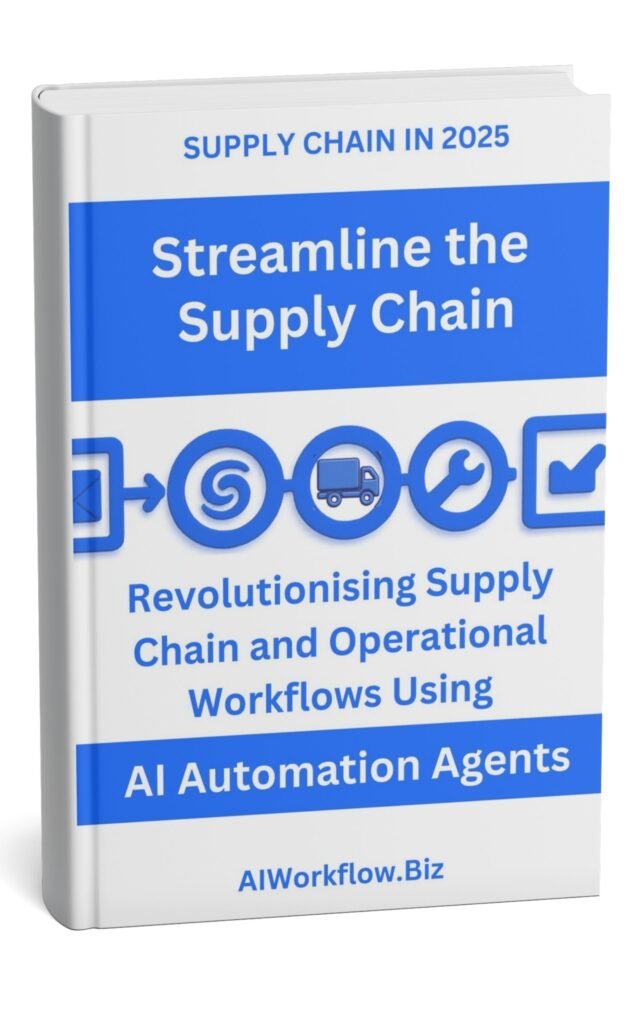Streamline the Supply Chain
With Automation Agents That Think
Your behind-the-scenes upgrade to smoother, smarter operations
Supply Chain has changed in 2025
Supply chain headaches? Yeah—we’ve all been there. Too many moving parts. Too many systems that don’t talk to each other. Too much firefighting.
This book is your cheat code.
Streamline the Supply Chain walks you through how AI automation agents can take the load off your team, connect your tech stack, and make your entire supply chain run like a well-oiled machine. Think fewer delays, less manual work, and more time to focus on what actually matters.
You can get the book and audiobook for free on Google Play, and if you prefer to listen, there’s also a podcast based on the book.
Here’s a quick peek at what’s inside.
What You Can Automate (Starting This Week)
If you’re in operations, logistics, procurement, or just tired of fixing the same bottlenecks every week—these use cases are for you:
Sync purchase orders, inventory, and supplier data across platforms—automatically.
Trigger reorder points based on real-time stock levels (no more “we ran out” moments).
Keep customers and partners in the loop with automated status updates and alerts.
Spot delays or disruptions before they hit the bottom line with predictive insights.
Hand off manual data entry, invoice matching, and report generation to AI agents.
Build flexible workflows that adapt when things change—without needing to code.
Cut down lead times and improve communication across the whole chain.
Why It Matters
Manual work is slowing down your supply chain. And disconnected systems? They’re killing your margins. AI agents aren’t just faster—they’re smarter. They help you work ahead of problems instead of reacting to them.
This isn’t about replacing people—it’s about giving your team breathing room and control.
Want to See How It Could Work for You?
Let’s chat. If you’re curious how automation could smooth out your supply chain without a full tech overhaul, book a free AI Automation Discovery Call.
Get the book and audiobook free on Google Play
Listen to the podcast version
Book a free discovery call and start streamlining today
Running a supply chain doesn’t have to be chaotic. Let AI handle the heavy lifting—so you can lead with clarity.
— From the team at AIworkflow.biz
Listen To The Podcast From The Book
Unlock the Future of Supply Chain Management with AI
Are you ready to revolutionize your supply chain and operational workflows?
In today’s fast-paced business environment, innovation is not just an option; it’s a necessity. This book, Revolutionizing Supply Chain and Operational Workflows Using AI, serves as your comprehensive guide to harnessing the power of artificial intelligence to transform your organization’s operations.
Why This Book?
- In-Depth Exploration: Delve into the current landscape and discover how AI is reshaping supply chain management.
- Actionable Insights: Learn practical strategies that can be immediately implemented to drive efficiency and cost-effectiveness.
- Real-World Applications: Benefit from case studies that showcase successful AI implementations and the lessons learned along the way.
What’s Inside?
Fundamentals of AI in Supply Chain Management
- Understand key concepts in AI and machine learning.
- Explore the intersection of supply chain and AI technologies.
Demand Forecasting & Inventory Optimization
- Discover techniques for accurate demand forecasting.
- Learn how to leverage AI for smarter inventory management.
Real-Time Tracking & Proactive Alerts
- Embrace the importance of real-time data in your supply chain.
- Set up exception alerts for effective, proactive management.
Warehouse Automation & Fulfillment Processes
- Get an overview of automation technologies in warehousing.
- Streamline fulfillment processes through AI innovations.
Efficiency & Scalability
- Find out how AI can reduce time spent on non-core tasks.
- Assess the cost-benefit of AI scalability for growing businesses.
Revenue & Cost Optimization
- Uncover smarter lead handling and abandoned cart recovery techniques.
- Analyze labor cost reductions and strategic resource allocation.
Implementation Strategies & Risk Reduction
- Learn the crucial steps for implementing AI solutions.
- Explore how AI can minimize human error and enhance compliance.
Intelligent Reporting & Future Trends
- Gain insights through real-time reporting capabilities customized for stakeholders.
- Anticipate emerging technologies and the future of operational workflows in supply chain management.
Overcoming Challenges
- Identify common barriers to AI integration and how to effectively tackle them.
Take the Next Step
This book is more than just a read; it’s an essential resource for practitioners, managers, and decision-makers looking to elevate their supply chain operations.
Don’t let your competitors outpace you. Equip yourself with the knowledge and tools to integrate AI into your supply chain and operational workflows effectively.
Your journey towards a smarter, more efficient supply chain starts here.
Secure your copy today and be at the forefront of the AI revolution in supply chain management.
Schedule a AI automation strategy meeting.
No preparation or technical skills needed.

Schedule a AI automation strategy meeting.
No preparation or technical skills needed.
AI Automation Strategy Call
– What You’ll Get:
During our session, we’ll uncover how AI and automation can significantly streamline your business operations — without complexity or risk.
✅ What to Expect in the Meeting:
Discover AI opportunities tailored to your business – even if you’re not sure where to start.
Identify your low-hanging fruit – quick wins that deliver real value fast.
Explore fixed-price automation projects – simple, affordable, and outcome-focused.
Gain clarity on what’s possible (and what’s not) – no hype, just practical impact.
Understand what can be automated now – from repetitive admin tasks to marketing, sales, support, and more.
Start with just one project – no need to tackle everything at once.
💡 Whether you come with automation ideas or not, we’ll help you define the best starting point based on efficiency, ROI, and ease of implementation.

